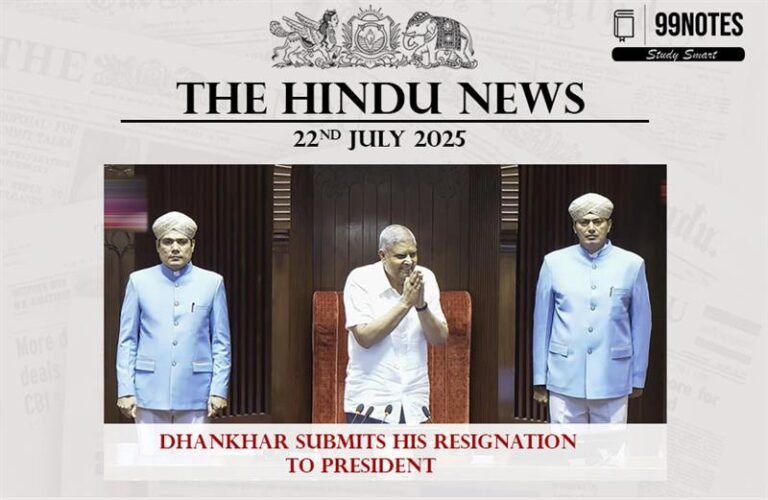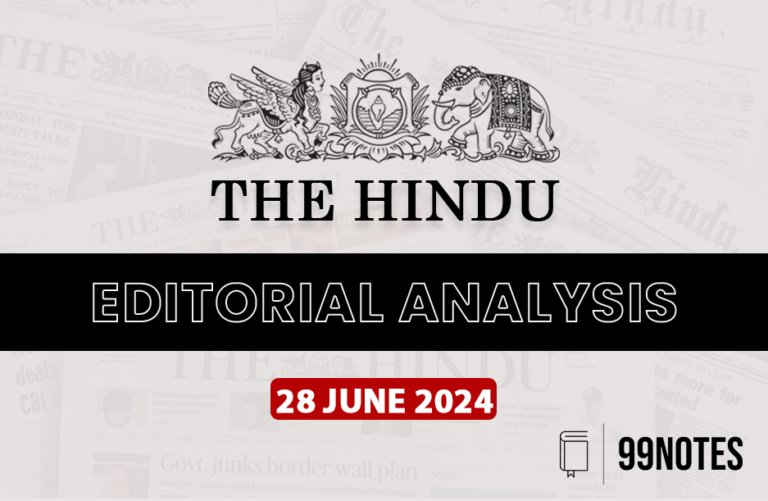16 May 2023 : The Hindu Editorial
The Hindu Editorial
16-May-2023
Daily Current Affairs For UPSC ,The Hindu Editorial Summary
1. Delving into the verdict on the Shiv Sena issue.
Topic: GS2.
Context:
-
-
-
The Supreme Court of India criticized the Maharashtra Governor’s action of calling for a floor test, characterizing it as illegal, as the Governor did not have objective material to indicate the loss of confidence in the incumbent government.
-
-
Comments from the court:
-
-
-
The Court emphasized that Governors should not involve themselves in inner- or intra-party disputes and that the Governor’s action triggered the resignation of the Chief Minister.
-
However, the Court found nothing wrong with the Governor inviting Eknath Shinde to form an alternative government, as it is the constitutional responsibility of a Governor to explore such possibilities when the incumbent government falls.
-
The Court stated that the Governor should have asked the leader of the Opposition in the Assembly whether they were in a position to form a government instead of choosing a member of the Shiv Sena, which showed involvement in the inner-party conflict.
-
The Court’s approval of the swearing-in of the Shinde government overlooks the continuing impact of the Governor’s “illegal” act of calling for the floor test, raising concerns about the moral aspect of the judgment.
-
The question of the validity of the whip issued by each faction of the Shiv Sena was referred back to the Speaker, who is responsible for deciding on disqualification petitions.
-
The Court clarified that the political party, not the legislative party, can appoint the whip and the legislative party leader.
-
The judgment introduced confusion by suggesting that two rival factions exist within a party, whereas the Tenth Schedule of the Constitution contemplates an original political party and a faction that arises from a split in the original party.
-
The Court failed to address the explanation to paragraph (2)(1) of the Tenth Schedule, which clarifies party affiliation and establishes that members of the Shinde faction belong to the original political party led by Uddhav Thackeray.
-
The original political party can issue a valid whip, and members who defied Uddhav Thackeray’s whip may be liable for disqualification.
-
The judgment lacks clarity on the role of the Speaker in deciding which faction is the real party and could have stated that Uddhav Thackeray’s party alone can issue a valid whip, reducing confusion.
-
-
2. A Court recall that impacts the rights of the accused.
Topic: GS2.
Context:
-
-
-
The right to default bail, available to accused persons when the investigating agency fails to complete its investigation within a specified time, is a fundamental right.
-
-
Issue:
-
-
-
The Supreme Court of India’s decision to recall its own judgment in Ritu Chhabaria vs Union of India has raised concerns among legal professionals.
-
The recall order, made at the insistence of the Solicitor-General of India, could impact the rights of the accused to be released from custody.
-
The Court has previously recognized default bail as an indefeasible right flowing from Article 21 of the Constitution, which guarantees the right to life and personal liberty.
-
The Court has consistently held that incomplete charge sheets or attempts to circumvent the default bail procedure should not prevent the accused from seeking default bail.
-
The Court’s decision in Ritu Chhabaria reaffirmed these principles and did not introduce any new hurdles in the investigation process.
-
However, the Court’s decision to consider recalling the judgment raises concerns about the possible subordination of the right to default bail to the difficulties faced by investigative authorities.
-
The Court’s agreement to defer decisions on default bail for accused persons across the country further exacerbates the concerns about the erosion of constitutional rights.
-
It is important for the three-judge bench hearing this matter to prioritize procedural propriety and not sacrifice it for administrative convenience.
-
-
3. Doctors must be protected while they are working with patients.
Topic: GS3.
Issue:
-
-
-
Medical science has advanced significantly, but life still ends in death, leading to anger, disbelief, and lack of acceptance for those who lose loved ones.
-
Attacks on hospitals, doctors, and nurses by grieving individuals are a disturbing trend.
-
Kerala’s amendment to the Kerala Healthcare Service Persons and Healthcare Service Institutions (Prevention of Violence and Damage to Property) Act is a welcome and necessary intervention to protect healthcare workers and institutions.
-
The recent death of a young house surgeon, Vandana Das, has further highlighted the need for safety measures for healthcare workers.
-
Doctors have organized protests across the country, condemning the attack and demanding protection.
-
Coordinated assaults on healthcare workers in India have become increasingly common.
-
The proposed amendment in Kerala includes bringing verbal abuse and violent acts causing harm under the purview of the Act.
-
The amendment suggests increased jail terms and hefty fines for those found guilty.
-
The government aims to ensure time-bound speedy disposal of such cases and designate special courts in each district to handle these cases.
-
Other states should consider similar interventions to protect healthcare workers.
-
Implementation of the law should focus on deterrence and promoting the government’s commitment to addressing assaults on healthcare workers.
-
Measures such as providing security staff at hospitals, both private and public, can help ensure protection.
-
It is crucial for states to act to prevent further sacrifices of healthcare workers in the line of duty.
-
-
4. There should be zero tolerance for sale of illicit liquor.
Topic: GS2, GS3.
Issue:
-
-
-
Over the past few days, 17 people have died in two incidents in north Tamil Nadu after consuming spurious liquor.
-
This comes as a surprise as the State government had previously claimed that there had been no hooch tragedy in the last 14 years.
-
Data from the Union Ministry of Home Affairs and National Crime Records Bureau show that Tamil Nadu has had a relatively low number of illicit liquor deaths in recent years.
-
Methanol, the main cause of hooch tragedies, has been brought under the Tamil Nadu Prohibition Act since 2002, with amendments made to maintain control over its supply.
-
The recent incidents indicate the apparent use of methanol, pointing to administrative lapses and the availability of cheaper brews outside of government retail outlets.
-
Law-enforcing authorities, including the police, are being criticized for not adequately monitoring the movement of methanol.
-
There is a need for a uniform and comprehensive policy to address the issue of spurious liquor across states and to send a strong message of zero tolerance to law-enforcement agencies.
-
-
For Enquiry

15 May 2023 : The Hindu Editorial

16 May 2023 : Daily Current Affairs

Social Infrastructure

15 May 2023 : The Hindu Editorial

15 May 2023 : PIB

15 May 2023 : Daily Current Affairs

Kurukshetra Summary April 2023 : Panchayati Raj

13 May 2023 : PIB

13 May 2023 : The Hindu Editorial

13 May 2023 : Daily Current Affairs
The Hindu 15 May 2023 : The Hindu Editorial The Hindu Editorial
16-May-2023
Daily Current Affairs For UPSC ,The Hindu Editorial Summary
Facebook-f
Twitter
Youtube
1.Marriage…
Daily Current Affairs 16 May 2023 : Daily Current Affairs Daily Current Affairs
16-May-2023
Daily Current Affairs For UPSC ,Daily Current affairs of The hIndu…
Infrastructure Social Infrastructure Social Infrastructure refers to creating and maintaining facilities and structures that support the delivery…
The Hindu 15 May 2023 : The Hindu Editorial The Hindu Editorial
15-May-2023
Daily Current Affairs For UPSC ,The Hindu Editorial Summary
Facebook-f
Twitter
Youtube
1….
PIB 15 May 2023 : PIB Press Information Bureau
15-May-2023
Daily Current Affairs For UPSC ,The PIB ( Press Information Bureau…
Current Affairs 15 May 2023 : Daily Current Affairs Daily Current Affairs
15-May-2023
Daily Current Affairs For UPSC ,Daily Current affairs of The hIndu…
kurukshetra summary Kurukshetra Summary April 2023 : Panchayati Raj Chapter 1: Empowering Panchayati Raj Institutions:
Panchayat Raj institutions (PRIs) are pillars of…
Uncategorized 13 May 2023 : PIB Press Information Bureau
13-May-2023
Daily Current Affairs For UPSC ,The PIB ( Press Information Bureau…
The Hindu 13 May 2023 : The Hindu Editorial The Hindu Editorial
13-May-2023
Daily Current Affairs For UPSC ,The Hindu Editorial Summary
Facebook-f
Twitter
Youtube
1….
Daily Current Affairs 13 May 2023 : Daily Current Affairs Daily Current Affairs
13-May-2023
Daily Current Affairs For UPSC ,Daily Current affairs of The hIndu…




